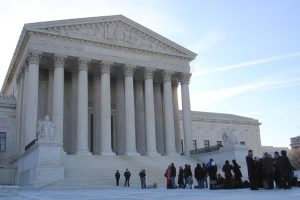Supreme Court Urged to Block Enforcement of TX Social Media Law
 WASHINGTON — Adult industry and sex worker advocacy groups have joined with other civil liberties organizations pressing the United States Supreme Court to block the implementation of a controversial social media censorship law passed in Texas, filing an amicus curiae brief in support of the plaintiffs in NetChoice v. Paxton.
WASHINGTON — Adult industry and sex worker advocacy groups have joined with other civil liberties organizations pressing the United States Supreme Court to block the implementation of a controversial social media censorship law passed in Texas, filing an amicus curiae brief in support of the plaintiffs in NetChoice v. Paxton.
The U.S. Court of Appeals for the Fifth Circuit recently reversed the decision of a lower court which blocked the new law. Under the statute’s structure, the law would grant Texas residents the right to file lawsuits against most major online platforms for moderation action the residents view as unfair. This could include lawsuits filed by far-right extremist groups who violate terms and conditions on mainstream social media platforms prohibiting the posting of hate speech.
Ken Paxton, the Republican attorney general of Texas, applauded the ruling by the Fifth Circuit. The civil liberties groups looking to block House Bill 20 have filed a motion for an emergency stay from the law.
The state’s defense of the law relies the so-called “common carrier” argument, which holds that social media and virtually all interactive computer services that enable third-party use should be regulated in the same fashion as telephone services and utility companies.
Opponents to House Bill 20 are concerned.
“Texas HB20 is a dangerous, misguided law that will do enormous harm to online safety and free expression,” says Ricci Joy Levy, CEO of Woodhull Freedom Foundation. The foundation campaigns for sex work and sexual expression to be enterprises and activities protected by basic human rights defined under United Nations conventions and most democratically elected governments throughout the world.
Woodhull also presents the controversial Texas law as a threat to the human rights of sex workers and adult content creators.
“This law forces private platforms to allow hate speech and scientific misinformation and prevents them from addressing bullying and harassment,” adds Levy. “Sexual rights are human rights, and HB20 makes online existence less safe for marginalized populations, creating a chilling effect for those who speak openly about issues like sex, sexuality, gender identity, sex work, and sex education.”
The Electronic Frontier Foundation, the Center for Democracy and Technology, R Street Institute, and the National Coalition Against Censorship have now joined Woodhull in pressing the Supreme Court for an emergency block.
“Our brief before the Supreme Court explains that, under this misguided law, platforms would have to end content moderation practices that often benefit digital users,” argues Alexandra Reeve Given, president and chief executive of the Center for Democracy and Technology. “For example, sites that forbid encouraging suicide or promoting terrorism but allow other discussions of these topics would face the threat of lawsuits accusing them of ‘bias’.”










